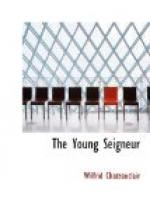The garden stretched behind the manor-house. Along its paths these children delighted to explore the motherly currant-bushes. Old-fashioned flowers stocked it, and, as Chrysler walked away among them, they reminded him of the simple gardens of his childhood before the showy house-plant era had modernized our grounds. There were erect groups and rows of hollyhocks; monkshood offered its clusters of blue caps; striped tulips and crimson poppies flourished in beds of generous shapes; delicate astors, rich dahlias, and neat little bachelors’ buttons peeped in crowds from green freshnesses. This was one of Madame’s domains, where she walked, weeded and superintended every morning in broad straw hat and apron; and it was to Chrysler one of the attractions of the Manoir.
CHAPTER XXVIII.
GRANDMOULIN.
“Que Demosthenes,
En haranguant,
Entraine Athenes,
Come un torrent!”
—JACQUES VIORR—LE JARGON DU BEL-ESPRIT.
The events to which all others were leading now began to happen.
The great nomination day,—Sunday—is here. Mass is over, the whole parish, aye and crowds from far and near behind, surge all over the square, where the Church looks down upon them in serenity and silence.
When Chrysler came up, the Cure and his vicar were sitting on their gallery, and a man of strong frame stood upon the crier’s rostrum looking round with the assertive consciousness that he was a recognized figure. His face wore a beard of strong but thin black wisps, which would have been Vandyke in form had it been heavier, but allowed the forcible outlines of his chin and cheek to be visible; and his locks, imitated by many a follower throughout the Province, were worn like Gainbetta’s in a long and swelling black mass behind. His countenance, evidently from long experience, was so controlled that no trace of natural expression could be discerned upon it beyond an appearance of caution and diplomacy; but whatever its specific character, it bore without gainsay the stamp of power.
The man was Grandmoulin.
After looking this way and that way for several moments allowing the assemblage to hush, he began in a quiet tone.
“My friends!”
He paused deliberately some moments to permit the people’s curiosity to concentrate upon him.
“My brothers!”
This with a rising, powerful voice.—Then higher:
“French—Canadians!!” separating the two words.
The audience strained with attention to hear him. What he had to say next became a matter of suspense.
Then with inflection of passionate enthusiasm:
“Canadian FRENCHMEN!!!” he cried, hurling out all his force. And the people could no longer restrain themselves; the rhetorical artifice took them by storm, and they shouted and cheered with one loud, far-echoing, unanimous voice.




